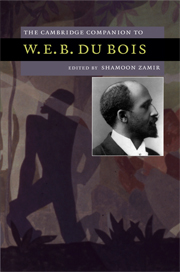Book contents
- Frontmatter
- Introduction
- 1 The Souls of Black Folk: Thought and Afterthought
- 2 “Of the Coming of John”
- 3 The Fiction of W. E. B. Du Bois
- 4 Du Bois and the “New Negro”
- 5 Du Bois, Black Leadership, and Civil Rights
- 6 Du Bois, Race, and Diversity
- 7 Du Bois on Race: Economic and Cultural Perspectives
- 8 Africa and Pan-Africanism in the Thought of Du Bois
- 9 The Place of W. E. B. Du Bois in American and European Intellectual History
- 10 Race, Marxism, and Colonial Experience: Du Bois and Fanon
- Further Reading
- Index
7 - Du Bois on Race: Economic and Cultural Perspectives
Published online by Cambridge University Press: 28 November 2008
- Frontmatter
- Introduction
- 1 The Souls of Black Folk: Thought and Afterthought
- 2 “Of the Coming of John”
- 3 The Fiction of W. E. B. Du Bois
- 4 Du Bois and the “New Negro”
- 5 Du Bois, Black Leadership, and Civil Rights
- 6 Du Bois, Race, and Diversity
- 7 Du Bois on Race: Economic and Cultural Perspectives
- 8 Africa and Pan-Africanism in the Thought of Du Bois
- 9 The Place of W. E. B. Du Bois in American and European Intellectual History
- 10 Race, Marxism, and Colonial Experience: Du Bois and Fanon
- Further Reading
- Index
Summary
For a generation of young, urbane, adventurous college graduates aspiring to an academic career, the late nineteenth century was a period of singular excitement and opportunity. America, struggling with the challenges of rapid urban and industrial growth, was open to foreign ideas and precedents, an intellectual sea-change challenged accepted dogmas and beliefs, the new social sciences came into their own, and transatlantic travel had become cheaper and easier than ever before. W. E. B. Du Bois's intellectual development and academic work owed much to his participation in the lively transatlantic exchange of ideas and atmosphere of experimentation which helped define the intellectual parameters of the fledgling social sciences and shaped the political ideas of a generation of progressive thinkers in the United States. In turn, Du Bois's historical and sociological research, from his student days at Fisk University, Harvard College, and the University of Berlin in the 1880s and 90s to his resignation as professor at Atlanta University in 1909, yielded a number of pioneering studies which advanced innovative research methods, opened up new fields of inquiry, and shattered old orthodoxies. Though encompassing only a small segment of his overall oeuvre, they provided crucial analytical underpinnings of his thought and activism throughout his career. Generations of students have been inspired by Du Bois's work, yet his contemporaries paid little attention to his record as historian and social scientist. In his Autobiography (1968), he bitterly remarked that African American academics “remained unrecognized in learned societies and academic groups. We rated merely as Negroes studying Negroes, and after all, what had Negroes to do with America or science?”
- Type
- Chapter
- Information
- The Cambridge Companion to W. E. B. Du Bois , pp. 102 - 116Publisher: Cambridge University PressPrint publication year: 2008
- 1
- Cited by



